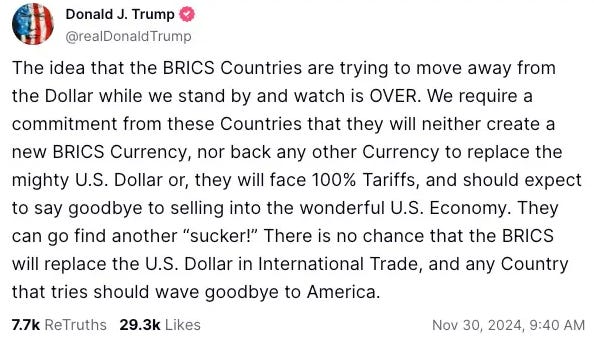The Morning Sixpack - December 2, 2024
Biden pardons Hunter, Syria is in disarray, and Ukraine fights for sovereignty
1. Biden Pardons Hunter, Citing “Miscarriage of Justice” in Controversial Decision
In a stunning reversal, President Joe Biden pardoned his son, Hunter Biden, on Sunday night, marking a pivotal moment in his presidency.
The decision, first reported by NBC News, came after months of public insistence that he would not use his executive authority to intervene in Hunter’s legal troubles. Biden defended the pardon as a response to what he called “raw politics” that had undermined the justice system.
"This was not an easy decision, but I believe the process was tainted, and it led to a miscarriage of justice," Biden said in his statement, appealing to Americans for understanding.
Hunter Biden was facing sentencing on federal gun charges and separate tax evasion charges in December. The president issued a "full and unconditional pardon" covering all offenses committed between January 2014 and December 2024, ensuring Hunter would not serve jail time.
The decision ignited a firestorm of political reactions (because of course it did), with critics accusing Biden of weaponizing his authority while supporters praised his defense of his family amid intense political scrutiny.
In his statement, Biden emphasized the toll of unrelenting public attacks on his son’s recovery journey, noting Hunter’s five and a half years of sobriety. Hunter echoed these sentiments, acknowledging his past mistakes during his struggles with addiction and pledging to use his second chance to support others battling similar challenges.
The pardon has fueled debate about fairness and political influence, setting the stage for a contentious dialogue in the months ahead.
Source: https://www.nbcnews.com/politics/joe-biden/joe-biden-issue-pardon-son-hunter-biden-rcna182369
2. Rebels Seize Aleppo in a Bold Offensive Amid Syria’s Escalating Conflict
The Syrian civil war, now in its 13th year, has entered a dramatic new phase as rebels led by the jihadi group Hayat Tahrir al-Sham (HTS) seized control of Aleppo, Syria's largest city and a vital economic hub. This offensive marks the most significant rebel gains in years, reigniting global attention on a conflict that has devastated the region and forced millions into exile. The attack, beginning last Wednesday, also saw rebels advancing into Hama province, underscoring a renewed push against the Assad regime.
The Syrian military, bolstered by Russian airstrikes, has mounted counterattacks to reclaim Aleppo, a city that previously fell to Assad’s forces in 2016 after a brutal siege. However, HTS and its allies are pressing their advantage, taking advantage of regional instability exacerbated by Israeli strikes that have weakened Hezbollah, Assad’s key ally.
Analysts warn that the resurgence of fighting could reopen a volatile front in the Middle East, drawing in global powers like Russia and Turkey and potentially destabilizing the region further.
Hayat Tahrir al-Sham, a group originally affiliated with al-Qaida, has sought to rebrand itself in recent years while maintaining control over Idlib province. While the group claims to promote civilian governance, it remains designated as a terrorist organization by the U.S. and U.N.
The ongoing battles in Aleppo not only challenge Assad’s hold over Syria but also raise concerns of broader regional fallout, with experts noting the potential for Islamic State sleeper cells to exploit the chaos and reignite their influence.
Source: https://apnews.com/article/syria-hts-assad-aleppo-fighting-2be43ee530b7932b123a0f26b158ac22
3. Trump Threatens 100% Tariffs on BRICS Nations Over Dollar Rivalry
President-elect Donald Trump announced a bold and stupid stance on international trade Saturday, threatening 100% tariffs on countries in the BRICS alliance if they pursue plans for a new currency to rival the U.S. dollar.
Trump’s statement, posted on his anemic Truth Social social media site, underscores his administration's intent to prevent any efforts to undermine the dollar's global dominance.
"The idea that the BRICS Countries are trying to move away from the Dollar while we stand by and watch is OVER," he declared, vowing to defend the U.S. economy.
BRICS, a coalition of emerging economies including Brazil, Russia, India, China, and South Africa, recently expanded to include Iran, the UAE, Ethiopia, and Egypt.
While the bloc has explored the use of local currencies and reducing reliance on the U.S. dollar, experts suggest a common BRICS currency remains unlikely due to geopolitical and economic disparities. Still, leaders like Brazil's Luiz Inácio Lula da Silva have floated regional currency initiatives, drawing sharp criticism from Trump, who views such moves as threats to U.S. financial hegemony.
Trump’s aggressive trade policy signals a broader strategy to counter global challenges to American influence.
The tariff threat follows his recent pledge to impose steep surcharges on goods from Mexico, Canada, and China, citing concerns over illegal immigration and drug trafficking.
As the BRICS nations position themselves as an alternative to Western-dominated global leadership, Trump’s hardline rhetoric sets the stage for potential clashes with key global players early in his administration.
Source: https://www.cnn.com/2024/11/30/politics/trump-brics-currency-tariff/index.html
4. Trump Nominates Kash Patel for FBI Director in Bold Move to Reshape the Bureau
President-elect Donald Trump has announced his intention to nominate Kashyap "Kash" Patel as the next FBI director, signaling a dramatic shift in the agency's leadership. Patel, a staunch Trump loyalist, has been vocal about his desire to reform the FBI, including proposals to downsize the agency's Washington headquarters and disperse employees nationwide. This move also marks Trump's plan to oust current FBI Director Christopher Wray, whom he nominated in 2017 but has since criticized.
Patel, a former national security official and federal prosecutor, gained prominence during Trump’s first term for his role in House Republicans' investigation into the FBI’s probe of Russian interference in the 2016 election. Known for his hardline stance, Patel has called for sweeping changes to the FBI, including rooting out "deep state" operatives and refocusing the agency on combating crime across the country. While Trump and his allies praise Patel as an “America First patriot,” critics question his qualifications and accuse him of promoting conspiracy theories.
The nomination has sparked intense debate, with Senate confirmation expected to be a challenging hurdle. While some Republicans, including House Speaker Mike Johnson, have rallied behind Patel, others have expressed skepticism about his readiness to lead the world’s most powerful law enforcement agency. Patel’s critics, including former Attorney General Bill Barr, argue that his lack of experience undermines his fitness for the role, raising the stakes for Trump's effort to overhaul the FBI.
5. German Chancellor Scholz Visits Ukraine, Announces New Military Aid Amid Western Tensions
In a surprise visit to Ukraine, German Chancellor Olaf Scholz pledged unwavering support for Kyiv amid growing fears that Western nations might scale back military aid and push for a negotiated settlement with Russia. Scholz’s visit, his first in over two years, included an announcement of $680 million in additional military assistance to Ukraine, underscoring Germany’s position as Europe’s leading supporter of Ukraine's defense against Russian aggression. “Germany will remain Ukraine’s strongest supporter in Europe,” Scholz declared upon his arrival on Monday.
The trip comes just weeks after Scholz faced criticism for holding a controversial phone call with Russian President Vladimir Putin, which Ukrainian officials condemned as bolstering Moscow's position ahead of potential peace talks. Ukrainian President Volodymyr Zelensky warned that such actions could open "a Pandora’s box," encouraging more leaders to engage with Putin and risk legitimizing Russia's stance. Scholz’s visit to Kyiv appears aimed at mending tensions and reaffirming Germany’s commitment to Ukraine’s sovereignty and security.
Scholz’s visit also serves domestic political purposes as he faces criticism at home for his cautious approach to arming Ukraine, particularly from conservative rivals and far-left and far-right parties advocating negotiations with Moscow. With early elections looming, Scholz is attempting to balance steadfast support for Ukraine while maintaining his pledge not to escalate the conflict further. European leaders, meanwhile, are preparing contingency plans should U.S. aid waver under the incoming Trump administration, which has signaled a potential shift in its approach to the war.
Make no mistake: Trump and Putin will align, and Ukraine will cede territory.
Source: https://www.nytimes.com/2024/12/02/world/europe/scholz-germany-ukraine-aid.html
6. Canada’s Shift on Immigration: Ads Warn Asylum Seekers of Strict Policies
Canada, long celebrated as a beacon of openness for refugees and immigrants, is adopting a more restrictive tone, launching a global ad campaign warning asylum seekers about the challenges of making a claim. The C$250,000 campaign, running through March in 11 languages, signals a dramatic policy shift by Prime Minister Justin Trudeau’s government.
Sponsored ads will caution potential asylum seekers that Canada’s system has “strict guidelines” and advise them to be informed before making a life-altering decision.
The campaign coincides with mounting pressures on Canada’s immigration system, including a 260,000-case refugee backlog and growing criticism over immigration's role in housing affordability. Trudeau’s government is also cracking down on misinformation about asylum claims and unauthorized immigration representatives, framing the move as part of a broader effort to manage global displacement and domestic sentiment. Experts, however, argue the messaging clashes with Canada’s historically welcoming stance toward newcomers.
This pivot reflects broader political challenges for Trudeau, whose administration recently announced cuts to immigration levels amid declining popularity in the polls. With temporary residents being encouraged to leave and the threat of deportation looming, Canada’s once-inclusive immigration narrative is shifting to a more cautious and controlled approach, sparking debates about the country’s evolving identity on the world stage.
This is Trudeau showing cowardice towards Trump’s tariff threats.





